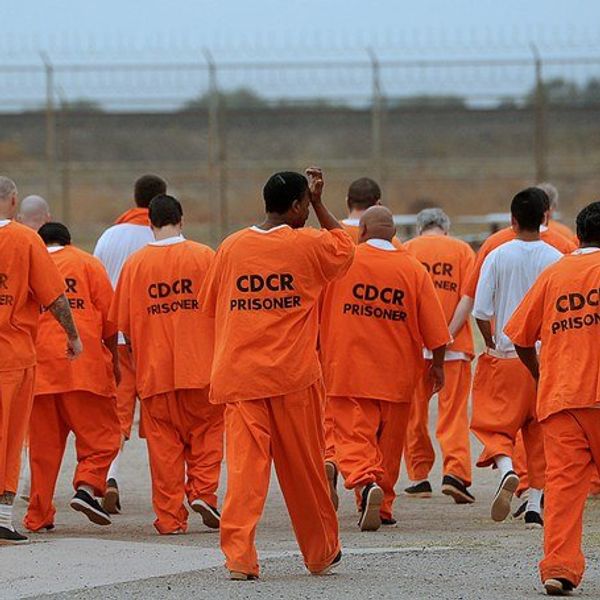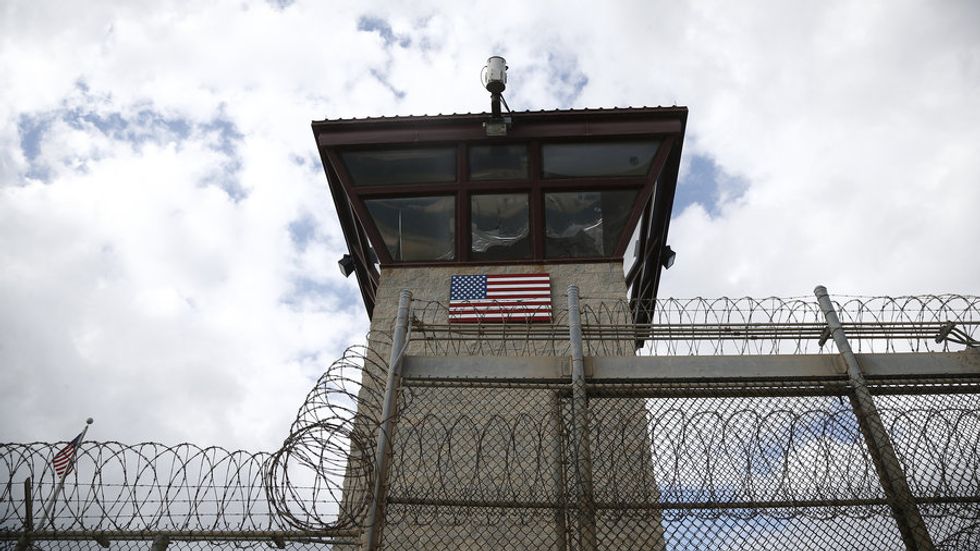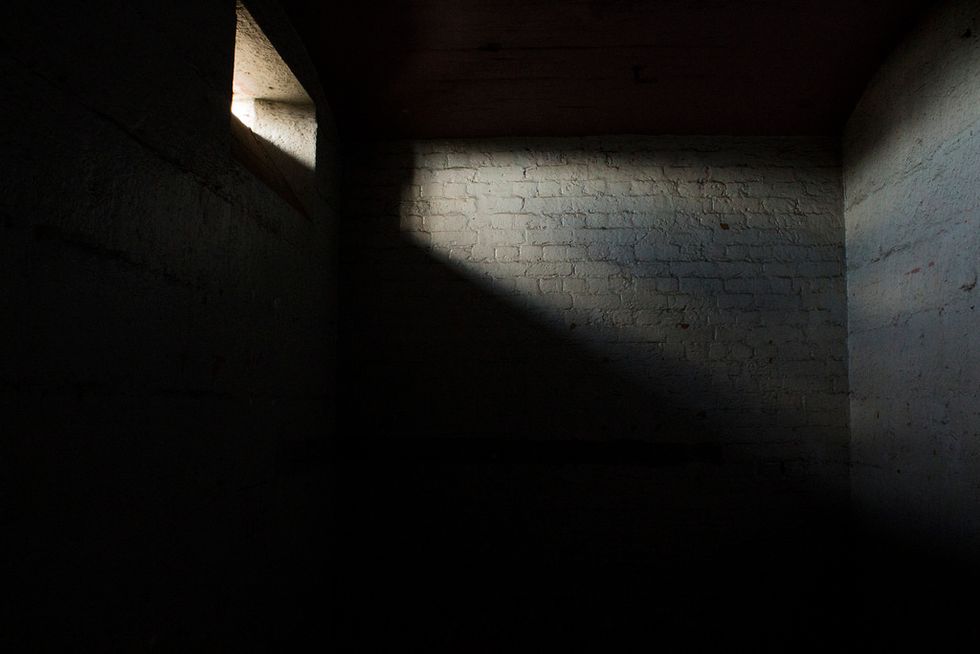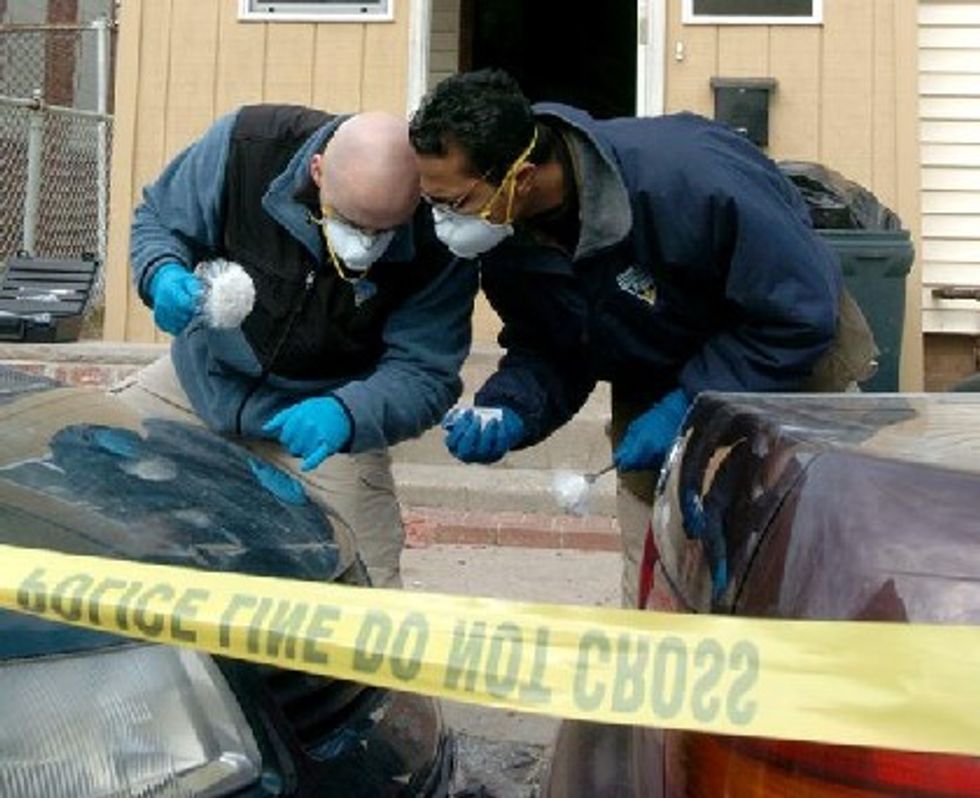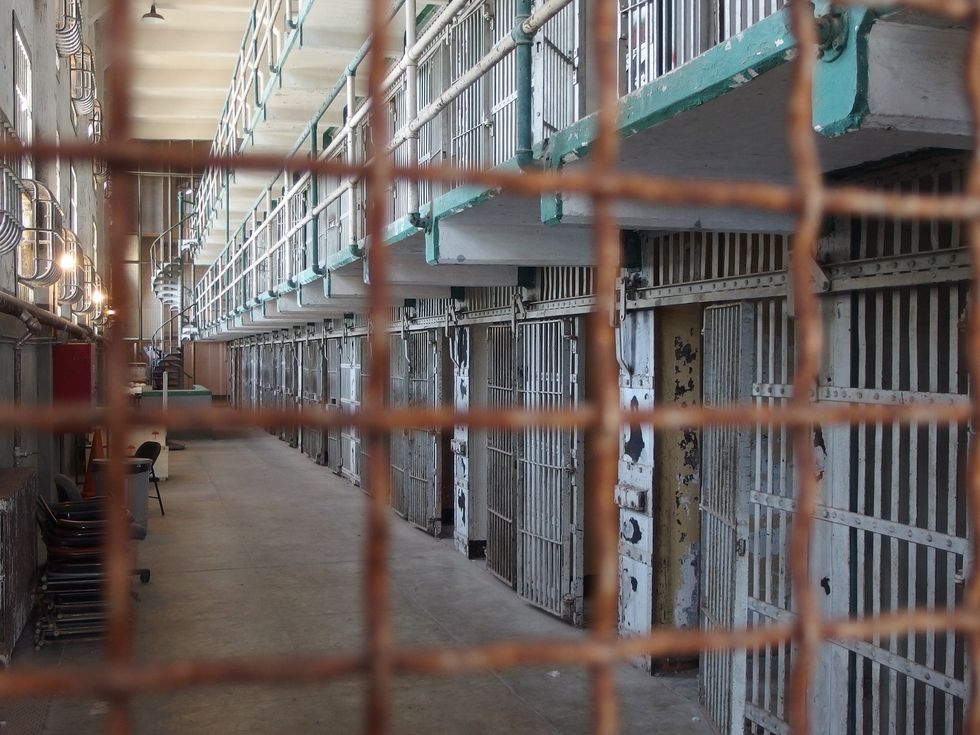Prison is meant to rehabilitate and reeducate, but the real question remains: does it?
I interviewed Corrections Officer Kourtney King, an ex-prison guard who is currently employed with a Sheriff’s Office in Atlanta, Ga. She is a recipient of the prestigious Public Safety Award from the Buckhead Business Association, as well as the 300 Club of Atlanta Award.
1. Prison systems are controlled as much by the gang population as they are by the officers.
"I worked at Telfair State Prison for a year and three months and am currently working in Administration for a Sheriff's Office in Atlanta, Ga."
Her jail experience has been a breeze compared to what she witnessed while working as a prison guard.
"One of the main things that stood out to me while working at Telfair State Prison was the control of the gang population. There was a time when the ‘leaders’ of the Muslims and the Bloods held a meeting with a supervisor in Administration to help control a riot between the two gangs."
2. It only takes two weeks of training to become a correctional officer.
According to the Bureau of Labor Statistics, corrections officers are expected to enforce rules, supervise, aid in rehabilitation and counseling and so forth.
Officer King adds to the list: "Monitor feeding, recreation and additional activities offered, generate reports as needed, and conduct hourly security rounds."
The job description is straightforward, almost cut and dry, but it does not come with the warning label most expect it to.
Actually, the only standard for becoming a corrections officer in the state of Georgia, King says, is “attend Georgia Public Safety Training Center (GPSTC) for two weeks, be efficient with shooting a weapon, complete a small obstacle once sprayed with OC spray and tased. Although, when I went through training, I was only required to finish training and shoot. No experience is required. I was 20 years of age when hired."
On job description websites like this one, the process sounds much more official and thorough than it actually is, complete with a "written examination that focuses on legal issues" and a psychological evaluation. But in reality, many states require just basic academy training to qualify for the position.
3. So, of course, the pay is bare minimum. Oh, and no guns.
"My yearly income was roughly $25,000, working a 12 hour shift. The prison was huge and held approximately 1,500 convicts. The staff was given no weapons, and on most days worked alone, we had nothing. The prison was a level 5 security prison which means maximum security. There was a mixture of minimum and maximum convicts but mostly maximum. You were expected to go in there, and do what you had to do."
Her income now at the local jail? $31–32,000 plus tasers and OC (aka pepper) spray.
"In the prison system, when I was first hired, there were no weapons issued to us. The only time we were given a gun was for perimeter security or inmate transfers. Before I resigned, they gave us OC spray which we had to sign in and out every day, but there was not enough for every officer to sign one out. We also had a 'shadowboard' for weapons kept in Central Control in the case that something happens, but if a riot suddenly breaks out in the yard, we can't just run back and grab a weapon. There’s not enough time for officers to make it there. So, we have to either stop them from fighting or just stand there and try to stay alive."
Since she left, prison systems have begun supplying officers with tasers and OC spray to cut down on the number of prison assaults and injuries.
"We were given some equipment to perform our duties, including a radio and a pipe. A radio was for transmitting and receiving important information from guard to guard so we could provide staff support if needed. The pipe, which is better known as Guard1 Plus, is used to manage the facility guard force. It specifies a time frame of the number of visits inside of the pods and generates a report that the supervisors may view daily. In situations where an inmate attacks, and you don’t have any weapons to defend yourself, you may use the radio and pipe. Supervisors have even advised me to use the radio and pipe when I may need to. To be clear that the radio and pipe are not weapons, and if used in an unjustifiable manner, you could find yourself in criminal trouble."
4. There are a lot of fights, and people die but not from what you'd expect…
"When a fight breaks out, the only thing you can use is your voice. If you're in the yard, you may be one of the targets because there's so much going on. But if inmates respect you, they will tell you to get out of the way. I once responded to a fight in the gym, inmate on inmate. While attempting to separate the inmates, one whispered to me, ‘Officer King, leave… get out of here.’ I immediately told him that I would not leave my team.”
"If you're the type of officer who is always disrespectful to inmates because ‘you can,’ then some may take advantage of that moment to hurt you. You have to use your voice to calm them down and control your situation through your words. If that doesn’t help, separate yourself and return with as much help as possible."
Fights are visually visceral, but death? Most times that's left to the imagination.
"Worst thing that I ever seen was an inmate committing suicide by hanging himself. A death happened on my assigned floor where a Caucasian and African American man exchanged words and possible licks were passed. To this day, we’re not sure what exactly happened. The Caucasian man had medical problems that led up to him having a heart attack due to the incident between him and his cell mate. Another inmate who was out for his daily free time advised me that a situation happened in the cell that belonged to the two inmates.
“I immediately responded, and through the door window, I noticed the Caucasian inmate was not moving on the top bunk. I withdrew my taser from the holster, yelled for the African American inmate to get on the ground, handcuffed him and advised the officer to escort him out. Then I immediately performed CPR. Even though my first instinct was "This inmate is had died," I still had to continue with CPR until medical staff arrived, followed by the local hospital EMT."
5. Trying to get street cred can put you in lock down isolation for 23 hours a day.
But that, too, depends on who the officer in charge is.
"You have certain pods with certain inmates who tell other inmates what to do and try to intimidate the guard. For instance, they may not be allowed to play basketball that day because of a rule violation, but if the inmate tells the officer he is going to play, the officer may let him go if the inmate comes appears threatening.
Mainly though, the convict feels he can get away with bullying others because of his reputation in that pod, so he knows the officer isn't going to say anything.”
"I've learned that as long as you're firm and consistent, they will listen and respect you. Usually, you’re in the same prison building every day, so you become familiar with each other. If there’s a new prisoner – most times it’s their first time in prison, and they may act out like a ‘class clown,’ disrespecting the officer and trying to act ‘cool.’ In most of those scenarios, the disruptive inmate is written up for his behavior and sent to lock down, which is single-man cell isolation for 23 hours of the day with one hour of free time.
"They try to earn 'street cred' by being rude to the officer and acting in an unacceptable behavior. Actual cases I’ve seen inmates earn 'street cred' is by what they’ve done in the real world. The only way to really earn 'street cred' in prison is to either kill someone (if you haven’t already) or behave in a threatening manner to intimidate other convicts.”
6. Yet somehow, there are a lot more women as prison guards than men.
In just 2006, the Census Bureau reported that out of the entire correctional officer population in the U.S., only 144 million were male whereas there were close to 150 million females.
"The turn rate for women is higher than men. A lot of men come in for a job to befriend the convicts because they’re really scared of giving inmates, yet at the same time, they don't want to be intimidated by them."
So, for male officers, it’s kind of complicated.
"I supervised over 250 inmates in a day and would get more respect than any of the male coworkers. We had to do checks every day for contraband and conduct hourly security rounds. They believe that is their home so if you do what you are supposed to do and not constantly disturb them, they'll respect you. Inmates will actually make sure no other inmates bother you."
"I supervised over 250 inmates in a day and noticed I would get more respect than my male coworkers. I would just be there, and they really like that. We had to do checks every day for contraband and conduct hourly security rounds, but otherwise, if you're not constantly disturbing them and calling them out, they’ll respect you. They believe the prison is their home, so do what you’re supposed to do, and some inmates will actually make sure that no other inmate bothers you."
It's no wonder, considering that women generally approach the situation in a non-aggressive manner, easing into the conversation and eliciting a favorable reaction from most prisoners.
Still, that doesn't mean they'll get by without someone trying to pick a fight.
"I've had times where other inmates have gotten mad at me and wanted to fight me, and other inmates defended me. I actually got in a fight where another inmate jumped in to protect me even before my coworker did.
“The inmate who attacked me was prescribed as mentally ill by a health personnel. We had entered the zone to begin dinner, and I directed all inmates to stand by their door. He became angry and refused to do so. He started towards me aggressively and then attacked. One of my orderly inmates – whose case was actually on an episode of 'The First 48' show for killing two women – jumped in to help me along with another prisoner who was actually, possibly, mentally ill. This second inmate who assisted me was known for biting and chewing his hand to the point where it became deformed. They both jumped in to defend me from the prisoner who had attacked."
7. Some inmates are loyal, but they all have small, strange ways of "rebelling."
"When they have a question, lot of inmates address guards by 'say officer,' before saying their last name. I don't know where this generated from, but it’s used quite often. They also use some slang, like 'chow time.'"
Contrary to popular misconceptions, most inmates are not "dumb," so to speak.
"A lot of them try to learn the law. They go to the library and learn the state code and laws to justify their court appeals, trying to prove they didn't do the crime/s they are accused of. Some speak with their lawyers, but they can only do so using the phone, never face to face. At Telfair, there were also educational and work programs in and a GED program for jailees."
As for loyalty, it depends on how fair the officer is.
"If there's one inmate who’s ruining it for everyone, he's the bad apple. Because of his behavior, the whole group can have privileges revoked, like not being allowed to watch TV. In those cases, the other prisoners are aware that he’s the problem, so they try to get him out of their zone by putting the inmate ‘on the door.’ This means the other inmates order the prisoner to pack his belongings and move out of the zone.”
8. The older convicts who may be innocent have a hard time proving it without today's forensics.
"People can go to prison and spend almost their entire life there for a crime they didn’t commit. A lot of older inmates who have done 30 years or more may be wrongly convicted due to the limited forensics back in the day, so there was no way to fight their case. There was this one prisoner who had been incarcerated for approximately 30 years. Around 6 months ago, I saw him on the news, released for having been wrongfully convicted of murder due to new evidence. He was actually one of my inmates.”
9. Not all officers are fair, and some believe in vigilante justice – through the prisoners.
"Most officers don't know what crime the prisoner is in for, but some make it a point to find out. I have done so in the past as well, to be aware of whom I should be extra cautious with while performing my duties. I avoid judging them because some people change from their past life, and sometimes, they can be wrongly convicted."
"A lot of times inmates don't know what the other inmates are in for, unless an officer tells them. For example, some officers may become angry with an incoming prisoner who's convicted of raping a little girl, so they may disclose that information to prisoners – which they obviously shouldn't do. But in most cases, inmates may know because they personally know the other convict's family and heard the news from visitors, or they have other outside connections that inform them."
So, would they ever target another prisoner?
"They have, and they will. I, personally, have never seen inmates attack a guy because he's a pedophile, but I have seen a blood gang inmate attack another blood gang inmate because he was told that the inmate was a homosexual. From how I’ve seen the prisoners react, apparently there’s nothing is wrong with being a homosexual in prison; you just can't be in a gang."
But what about the news?
"We try to avoid them watching any type of news. In the prison, we have control over the channel and what they hear, but we have very limited control over the information they may obtain from family members and friends. So they could find out that way or using the internet, if they’ve smuggled in phones and are getting the information that way. "
10. Some of the prison staff is just in it for the money.
"We're in a world where people just get jobs to say they have one. They have no intent to enjoy what they do or to help others. I worked with mentally ill inmates and have seen their conditions worsen over time due to the lack of support from either the staff or health personnel. Counselors may come in just to put on their paperwork that they have seen the inmate when the counselor may have stayed no more than five minutes. Most people who work in this career are in it just for the pay and benefits. I’m not saying we have to become their friend, but we need to understand, the way our hearts beat, same way their hearts beat."
"They have people who care about them just as much as we care about our family. Treat them like humans and be respectful, and they will do the same in return. You can even learn some things from them if you just take the chance to listen. A lot of the older inmates are knowledgeable."
11. And politically, I think we all agree; the prison system needs reformation.
As a criminal justice major, my class textbook described American prisons as modernly sophisticated and advanced, but in actuality, I’ve discovered that a lot of the programs we take for granted aren't even implemented or followed. And even worse, the standard of living falls way below what many Americans assume it to be – flat screen TVs and free healthcare.
“The prisons already don't have enough support. There could be mold all in the shower and their rooms. They have very few – almost none – options to better themselves. A lot of people go back to prison because they don't know how to adjust to society, how to wake up in the morning and how to find a job. They become so used to the guards telling them what to do and what not to do."
"Giving orders is what the system ends up being about. Telfair was a public institution, so order and direction helped the prison to run semi-well. Private prisons, from I've heard, are actually better and more organized. I know people back in my hometown who said they would rather work for private institutions like the CCA because the inmates there are well-mannered and the administration staff supports the workers.”
Our prison system has become monetized and far too structural, based on olden principles to be "tough on crime," but we've been doing that since the 80s, yet nothing has come of it. We need to reassess our societal perspective of justice and reevaluate its form of delivery.

